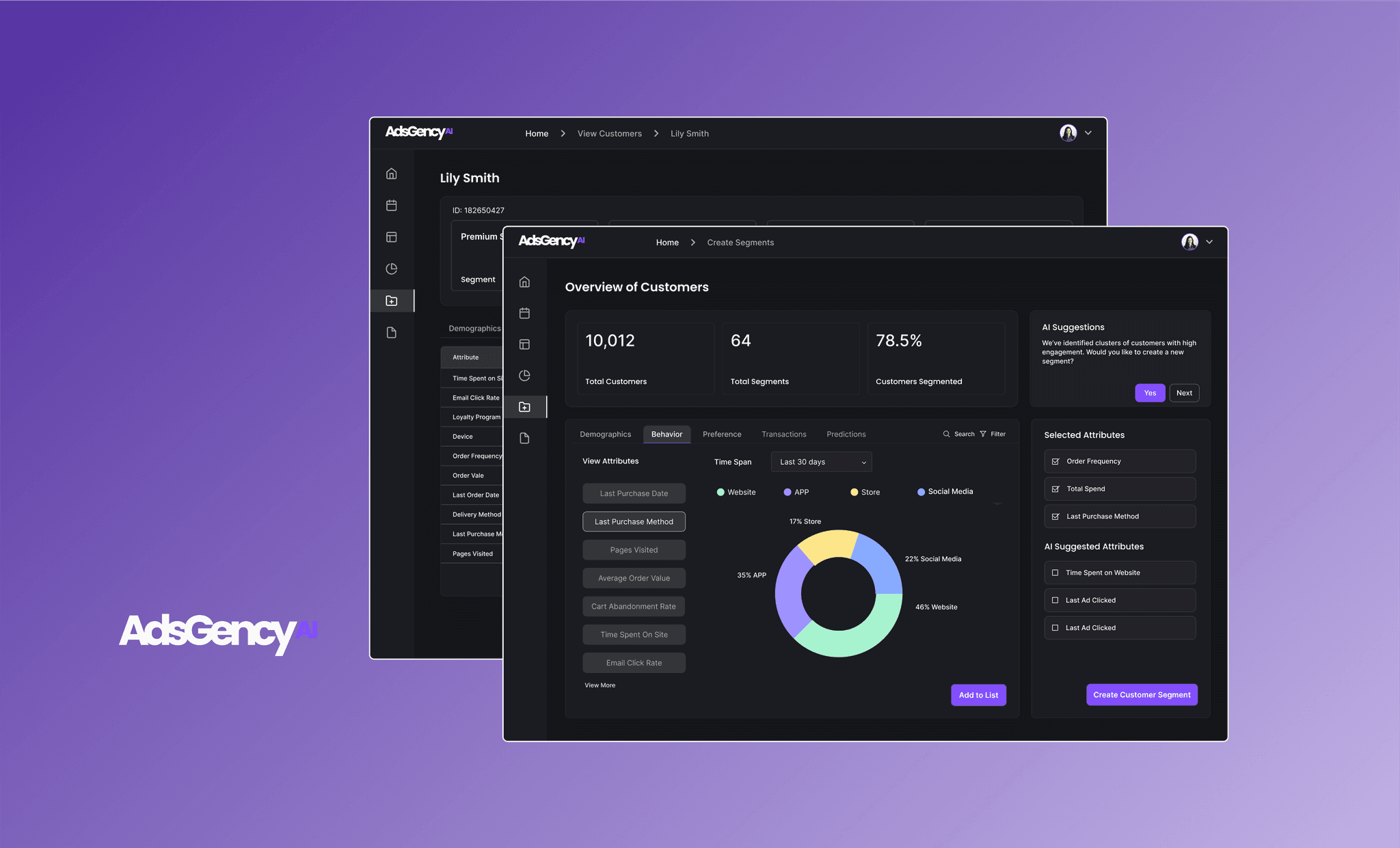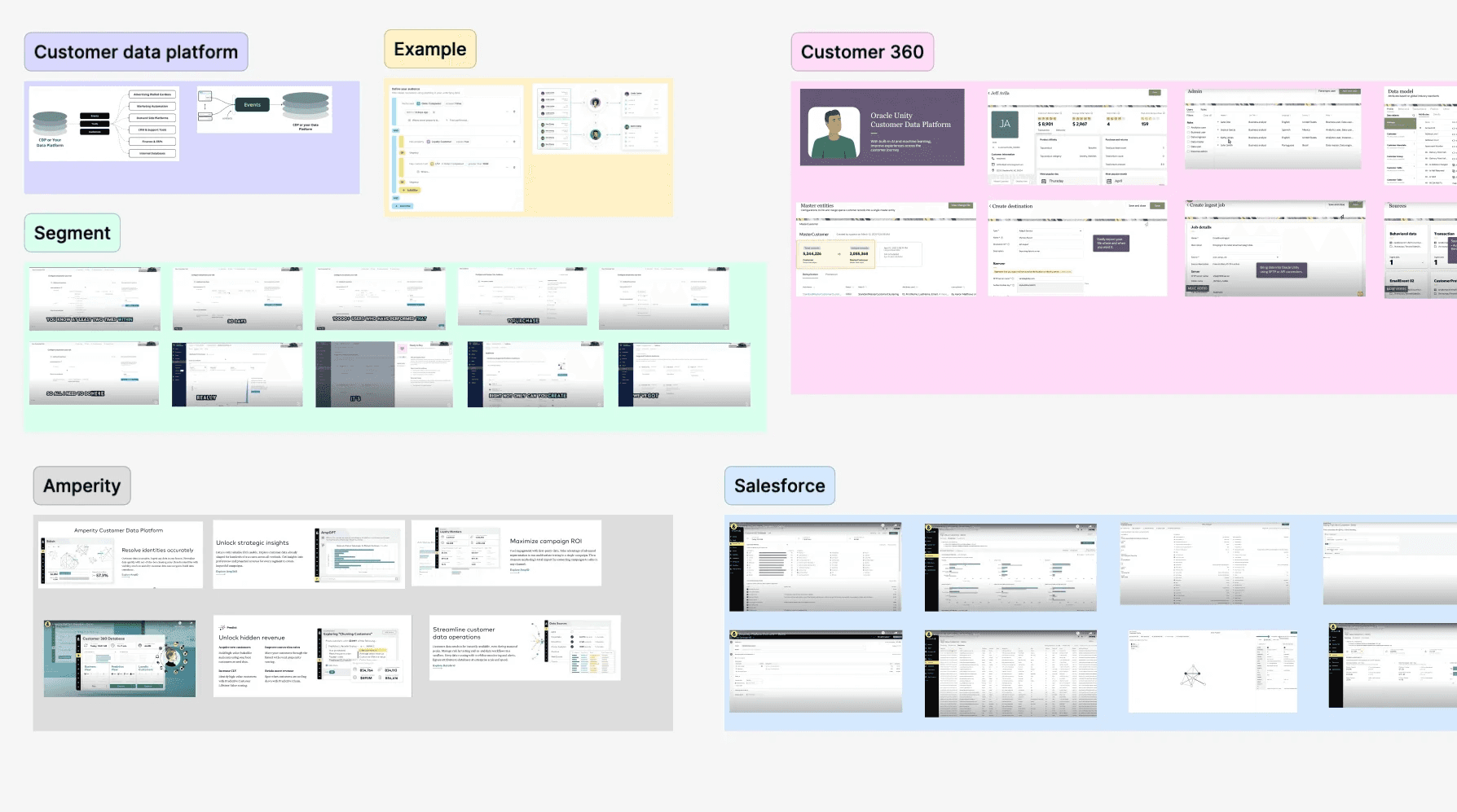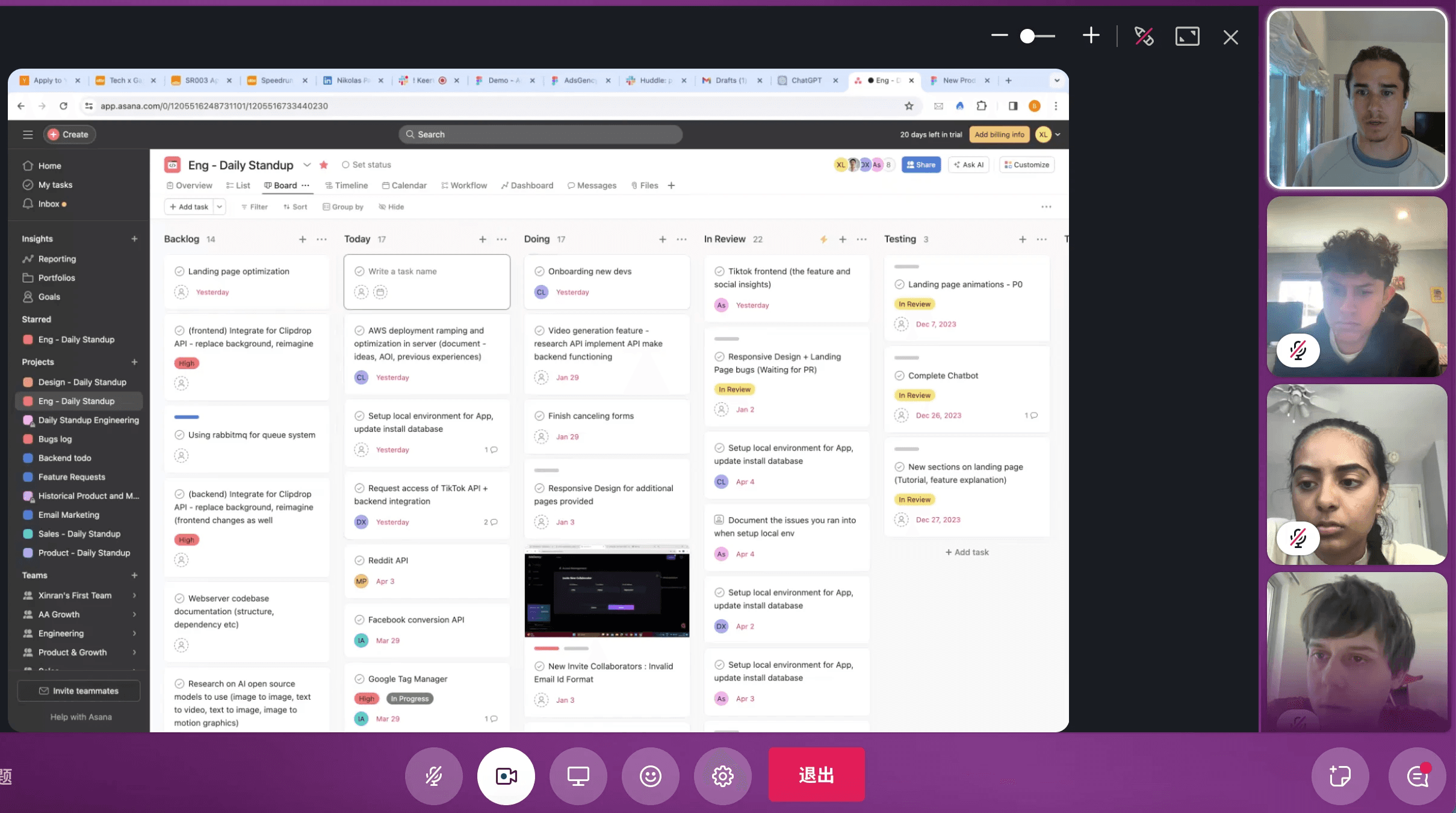
Integrate Customer Data for Personalized Advertisements.
Customer Data Platform | AI-powered| SaaS | 0-1
Duration
March - June 2024,
3 months.
Role
Lead Product Designer
Team
2 Designers, 1 Marketing Specialist, 1 Product Owner, Engineers.
Status
Launched 🚀
Overview
Background
Problem
Customers are the heart of marketing strategy. However, the platform currently generates ads and recommendations based solely on input text about customers, which lacks depth and specificity.
How might we help marketers to deliver personalized advisements to right customers at right time through right channel to maximum engagement and ROI?
Solution
We designed a platform that enables marketers to upload customer data, analyze customer behaviors, and leverage AI to generate insights. The AI personalizes advertisements and launches them to the customer's account.
Core Experience
Step 1
We enable marketers to connect their datasets and upload customer data for analysis.
Step 2
Marketers are able to analyze uploaded data and create customer segments with the help of AI insights.
Step 3
Marketers are able to create and launch personalized advertisements directly to customers in the segments.
Results
Users can add customer segments and profiles data instead of generic input text to generate more targeted marketing content for achieving higher conversion rates.
Before Input text
After Select Dataset
Impacts
1k+
New paid users in a month
25%
Improved retention rates
$2.4M
Raised funding
Research
User Research
I conducted user interviews to gain direct insights from marketers on how they develop a deep understanding of their customers and its impact on marketing success.
Sent 150+ E-mails to reach out
Received 30+ Screener Surveys
Conducted 8 Interviews
key Insights
I analyzed the user interview and developed user personas with key pain points to ensure alignment across teams.
😖 📊
Painpoint #1 Fragmented Data
Customer data is often scattered across multiple platforms (e.g., social media, CRM, websites, analytics tools), making it difficult to compile a complete picture.
😰 ⌛
Painpoint #2 Delayed Insights
Marketers struggle to react to customer behaviors (e.g., abandoned carts, recent website visits), leading to missed chances to re-engage users at the right moment.
😵💫 👬
Painpoint #3 Inaccurate or Insufficient Segmentation
Marketers segment customers manually based on predefined rules or basic demographic data. This can lead to generic campaigns that don’t fully resonate with the audience.
Design Goal
How might we integrate data from multiple platforms to deliver real-time insights and empower users to perform effective customer segmentation?
In-Depth Research
I discovered that the marketers I interviewed have limited knowledge of how AI can leverage customer data to create personalized advertisements. Therefore, I requested to conduct a SME (Subject Matter Expert) interviews with marketing specialist. I also conducted a competitive analysis and met with engineers to figure out the user flow and technical constraints.

Conducted 10+ SME interviews

Competitive analysis

Meetings with engineers
How do users create customer segments after uploading their data?
I outlined the process, along with the pros and cons, for three different user flow options to help users create customer segments after uploading data. We selected Option 3 because it speeds up the process while maintaining control and provides real-time insights.
✅ Pros:
Easy for beginners, guided process minimizes errors.
❌ Cons:
Can be slower for experienced users who need quick actions.
Option 2 AI-driven segmentation
✅ Pros:
Fast, highly automated, ideal for scaling campaigns.
❌ Cons:
Less manual control—users may want to define their own segments.
Option 3 Dashboard-based
✅ Pros:
Full control, advanced filtering, real-time audience size updates.
❌ Cons:
User Flow
I created user flows for the entire process and integrated them into the original workflows.
Design
Prototypes
We created prototypes based on the user flow and gathered feedback from team and users to validate our ideas.
Step.1 Upload Data
Step.2 Customer insights
Step 3. Create Segments
Meeting with engineers
I conducted a design review with the engineering team to assess feasibility and gather feedback. During the discussion, I learned that there are four distinct types of data.
Direct Data
Last Visit Date
6/24/2024
Category
Age Group
Calculation
E-Mail Open Rate
55%
Prediction
Lifetime Value
$5200
Prototypes and usability testing
We created prototypes based on the user flow and conducted usability testing with marketers to gather feedback.
Tasks and questions
Conduct 6 usability testings
Key Insights
😵 Insight 1 Limited customization options
Marketers like this dashboard because it allows them to analyze customer data and provide insights to create segments, but they would like the flexibility to customize it to fit business needs.
🤯 Insight 2 Complex segment creation
Marketers find it helpful to create segments for personalized ads, but the current workflow is too complex, and they need more guidance.
Meeting with the product owner
I met with the product owner to align on user challenges and technical constraints. To address these issues, I leveraged attributes, striking a balance between limited customization options and the complexity of predictive traits.
How can we offer users more customization options without increasing complexity?
Smaller, independent, reusable components
Defined by marketers according to their business needs
Integrated across platforms from the dashboard to segmentation
Enhanced with AI-driven insight and suggestions.
💡Attributes !
Attributes are specific characteristics derived from customer data.
Benefits of using attributes
🌟 Usability
🌟 Flexibility
🌟 Autonomy
🌟 Automation
🌟 Adoption
Iteration
Manage Attributes
Users can define attributes themselves for further analysis.
Version 1
❌ Cons:
Limited Scalability
The list may become excessively long as more attributes are added.
Lack of Filter Options
Users are unable to quickly filter and locate specific attributes.
Version 2 (Selected)
✅ Pros:
Easy Organization
Attributes are grouped into tabs and pages, making them easier to find.
AI-Driven insights
AI not only suggests new attributes but also identifies and removes outdated ones.
Improved Manageability
Users can seamlessly add, remove, or rearrange attributes.
Customer Dashboard
Users can explore each attribute on the dashboard for a deeper insight of customer behavior and trends.
Version 1
❌ Cons:
Lack of Actionability
Users cannot directly select attributes to proceed to the next step of segment creation.
Irrelevant Insights
While the analysis at the top provides useful customer insights, it does not directly assist in segment creation.
Version 2 (Selected)
✅ Pros:
Actionable Selection
Enable users to mark and select attributes for segment creation.
Relevant Analysis
Replace customer analysis with segment analysis to provide insights that directly assist in segments.
Improved Usability
Allow users to filter or search for specific attributes.
Customer Segments
Users can select attributes and define values to create customer segments.
Version 1
❌ Cons:
Complexity
Users must select attributes, define values, and determine the appropriate logic, making the process more intricate.
Lack of Guidance
Users may struggle to define segments effectively without sufficient knowledge or insights.
Version 2 (Selected)
✅ Pros:
AI Assistance
AI will suggest segment names and recommend relevant attributes for users who need guidance.
Simplified Selection
Replace dropdowns with sliders to enable users to select values more quickly and intuitively.
Improved Clarity
Write the customers in text format to ensure a clear and accurate understanding.
Customer Profile
Users can view the profile of each customer to learn about their behaviors.
Version 1
❌ Cons:
Redundant information
Demographic information will also be included in the list below.
Generic Analysis
The analysis at the top may not be relevant or useful for all customers.
Potential for Bias
Users might form unconscious biases based on the appearance of an avatar.
Version 2 (Selected)
✅ Pros:
Clear Display
Show the customer’s name as the title instead of their profile.
Relevant Information
Display the segment information at the top to allow users to analyze whether the segment is effective and accurate.
Results
Improvements
Users can add customer segments and profiles data instead of generic input text to generate more targeted marketing content for achieving higher conversion rates.
Before Input text
After Select Dataset
Impacts
1k+
New paid users in a month
25%
Improved retention rates
$2.4M
Raised funding
What I learned…
UX projects often face unforeseen challenges. Being flexible and adaptable is essential to navigating these obstacles. The ability to pivot and adjust based on new information allows teams to stay agile.
It is important to seek early feedback throughout the design and development process. Engaging stakeholders early on helps identify potential issues, gather diverse perspectives, and align expectations. This proactive approach not only improves the quality of the final product but also saves time and resources by addressing challenges before they become significant roadblocks.
Users Comments
"Game-changer in the advertising landscape and revolutionize the industry. "
































